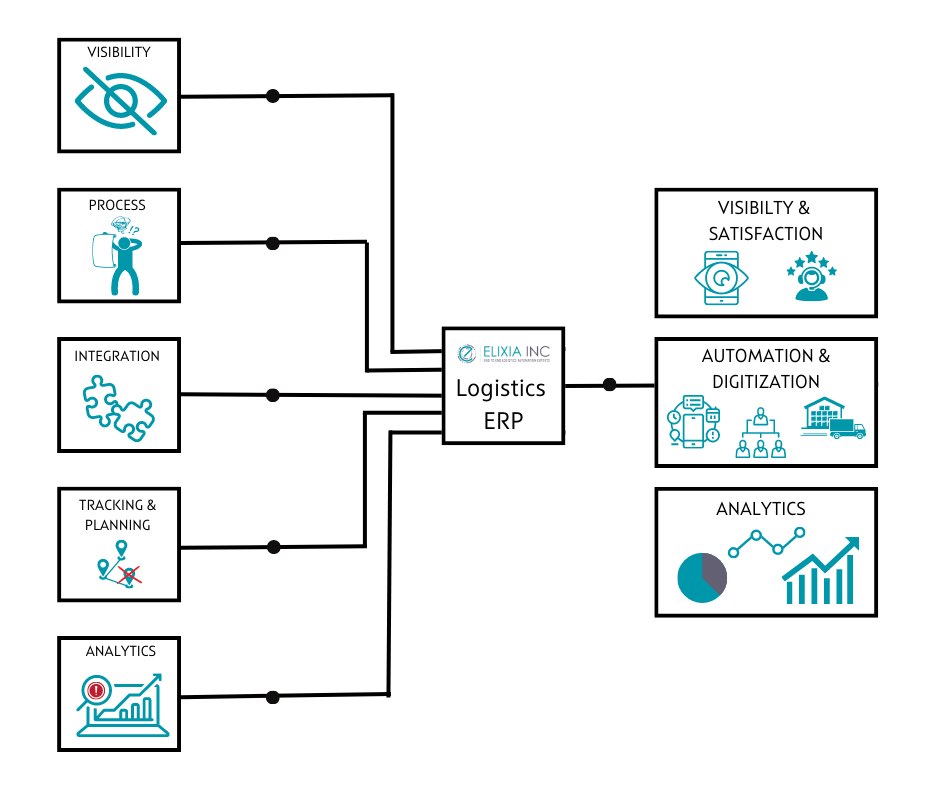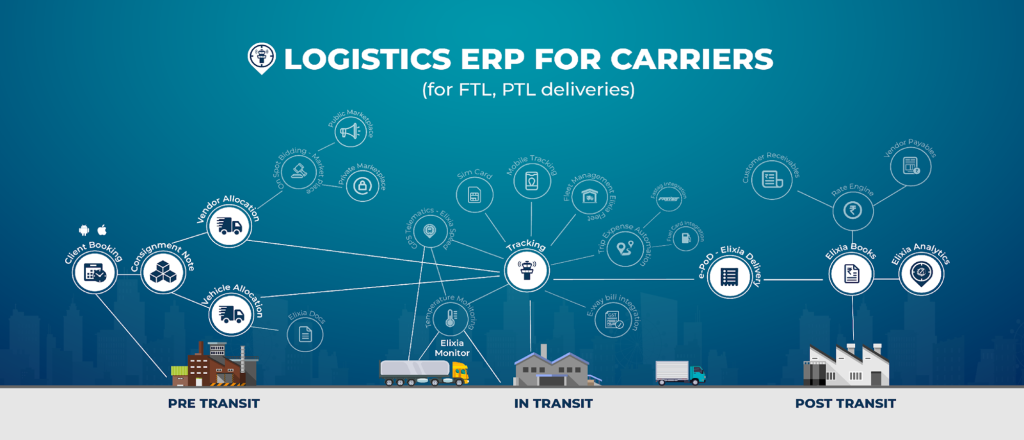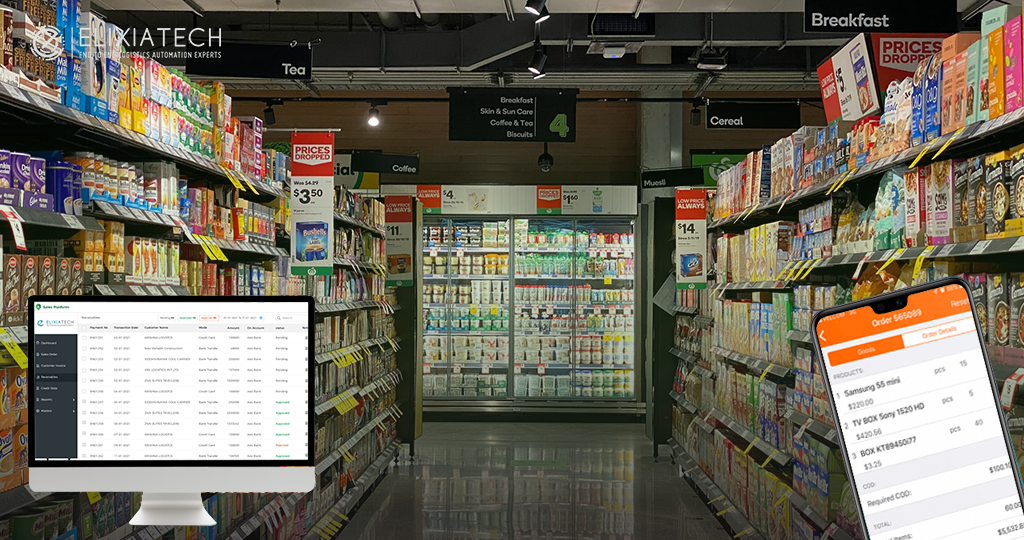
How to maximize efficiency & profitability with a Comprehensive Logistics ERP Solution
To adapt to the new normal, where companies are facing numerous challenges such as rising costs, complex supply chain management, increasing customer demands, etc; it is crucial to prioritize the optimization of supply chain operations for enhanced efficiency and profitability.
But the main question here arises “How to simplify the work processes efficiently and effectively?”
The simple answer to this is implementing “A comprehensive logistics ERP (enterprise resource planning) software solution”
What is a Logistics ERP solution?
A Logistics ERP solution is a specialized software system that provides businesses with a comprehensive platform to manage their logistics and supply chain operations. It integrates and automates processes such as inventory management, transportation, warehouse management, financial management, and order fulfillment. By centralizing and streamlining these functions, Logistics ERP solutions can assist businesses in achieving higher efficiency, reducing costs, and enhancing customer service through real-time visibility into their supply chain operations. Additionally, it can prove particularly advantageous for businesses operating in industries with intricate supply chains, such as manufacturing, retail, and distribution.

What is it like without a logistics ERP software solution?
Companies that do not have logistics ERP software may face several challenges in managing their supply chain operations. Some of the key challenges include:
Limited supply chain visibility:
Companies may lack visibility into their supply chain operations, which makes it difficult to track inventory levels, shipment statuses, and other important metrics. Consequently, this can lead to delayed processes, excess inventory, stockouts, and poor customer service.
Inefficient processes:
Companies may depend on manual processes, leading to time-consuming and error-prone activities that can be challenging to manage. As a consequence, inefficiencies and increased costs may arise.
Lack of integration:
Integrating logistics operations with other crucial business processes, such as financial management, procurement, and customer relationship management can pose a challenge for companies. Failure to do so can lead to data silos, redundant efforts, and missed chances for streamlining and improvement.
Inadequate planning & tracking:
Companies may lack the tools and information needed to plan and forecast demand, manage inventory levels, optimize transportation routes, and track shipments. As a result, they may face issues such as excess inventory, stockouts, missed delivery dates, negative customer experiences, and increased transportation costs.
Poor analytics:
Companies may struggle to analyze their supply chain data, which makes it difficult to identify trends, areas for improvement, and opportunities for cost savings. As a consequence, they may miss out on opportunities to optimize and reduce costs.
The implementation of an ERP system necessitates a substantial investment of time, money, and resources, leading businesses to question whether it is a worthwhile investment. Let’s explore how one can maximize efficiency to help you decide whether it’s worth investing in your organization or not.
How to maximize efficiency and profitability:
Logistics ERP has the power to revolutionize your business. By streamlining processes, enhancing visibility, optimizing transportation, integrating business processes, and utilizing analytics, companies can increase efficiency and profitability. Implementing these strategies can help businesses achieve long-term success in a highly competitive market.

Streamlined Operations:
Logistics ERP software solutions automate and streamline key logistics and supply chain management processes, allowing companies to reduce manual labor, eliminate redundant tasks, and accelerate processes, ultimately enhancing overall operational efficiency and lowering costs.
Real-Time Data & Visibility:
Companies can track inventory, monitor shipments, and pinpoint areas for improvement through real-time visibility. This visibility provides customers with accurate and up-to-date information, reducing the risk of delays, stockouts, and excess inventory while enabling them to make informed decisions.
Improved Customer Service:
A logistics ERP software solution helps companies improve customer service by providing real-time information about orders, inventory, and shipments. This results in faster product delivery, lower error rates, reduced costs associated with failed deliveries, and an overall improved customer experience.
Automate the supply chain process:
A logistics ERP software solution can help automate routine tasks such as inventory management, order processing, shipment tracking, and auto vendor allocation. This automation reduces the need for manual intervention and enhances efficiency. Through task automation, companies can minimize lead times, improve order accuracy, and reduce the risk of errors.
Warehouse management & digitalization:
Digitally managing warehouse operations helps avoid manual interference, human errors, and product wastage due to expiration. Furthermore, aids in tracking and mapping the inventory with FIFO, FEFO, etc., maintaining stock levels, and streamlining the order fulfillment process to improve overall productivity.
Reduce fleet management costs:
Fleets may be utilized to their full potential by adopting an ERP software system (load, space, and volume). It also aids in document renewal reminders, tyre replacement, and other maintenance alerts; timely service reminders; spare part inventory management (tyres, batteries); speedier approvals of job cards and payments; and fleet operational cost management. This helps to optimise the fleet while also lowering expenses.
Analytics:
Logistics ERP software identifies operational gaps, allowing timely corrective actions to avoid cost and operational slippage in the supply chain. It also provides intuitive reports to get insightful information on all supply chain processes. Which in turn helps in making intelligent business decisions.
How can Elixia’s solution maximize efficiency and profitability?
Elixia’s Logistics ERP Software Solution provides end-to-end automation and digitization of all logistics and transportation processes. It tracks all field services, like shipments, vehicles, and carriers. It also tracks the on-field workforce and even optimizes it in real-time on a single interface.
Come plan and manage your dispatch schedule, delivery routes, and capacity in the most cost-optimized way with Elixia.
Schedule a demo now: https://elixia.tech/schedule-a-demo/

To Sum Up:
Logistics ERP software is designed to help maximize efficiency and profitability in many areas of your business. A complete solution provides enhanced data and process visibility, shorter lead times, optimized resource utilization, and improved agility. It also helps you make informed decisions that translate into long-term results for your bottom line. Logistics ERP is crucial for businesses seeking to enhance efficiency, cut costs, and stay competitive in the fast-paced global economy.



